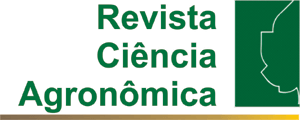ABSTRACT
Considering the need for increasing genetic variability in breeding programs of irrigated rice in Brazil, the aim of this work was to characterise phenotypically accessions of irrigated rice, and estimate genetic distance using multivariate analysis. Ninety-two accessions of irrigated rice were characterised phenotypically, and evaluated for 35 morphological descriptors, with 21 being characteristics of qualitative inheritance, and 14 quantitative inheritance. The quantitative characteristics discriminated the accessions into nine groups via genetic distance, distinguished from each other mainly by distribution of the subspecies indica and japonica. Whereas for the qualitative characteristics, five different groups were discriminated by dendrogram, demonstrating the global selection and use of genotypes with defined architecture and phenotypic patterns. From the phenotypic characterisation via multivariate analysis, it soon became clear that the genotypes grown in the State of Rio Grande do Sul displayed a narrow genetic base. However, the phenotypic variability exists for increasing this genetic base, with a consequent increase in the probability of acquiring and selecting genetically superior progeny.
Key words:
Genetic dissimilarity; Transgressive segregants; Phenotypic characteristics







